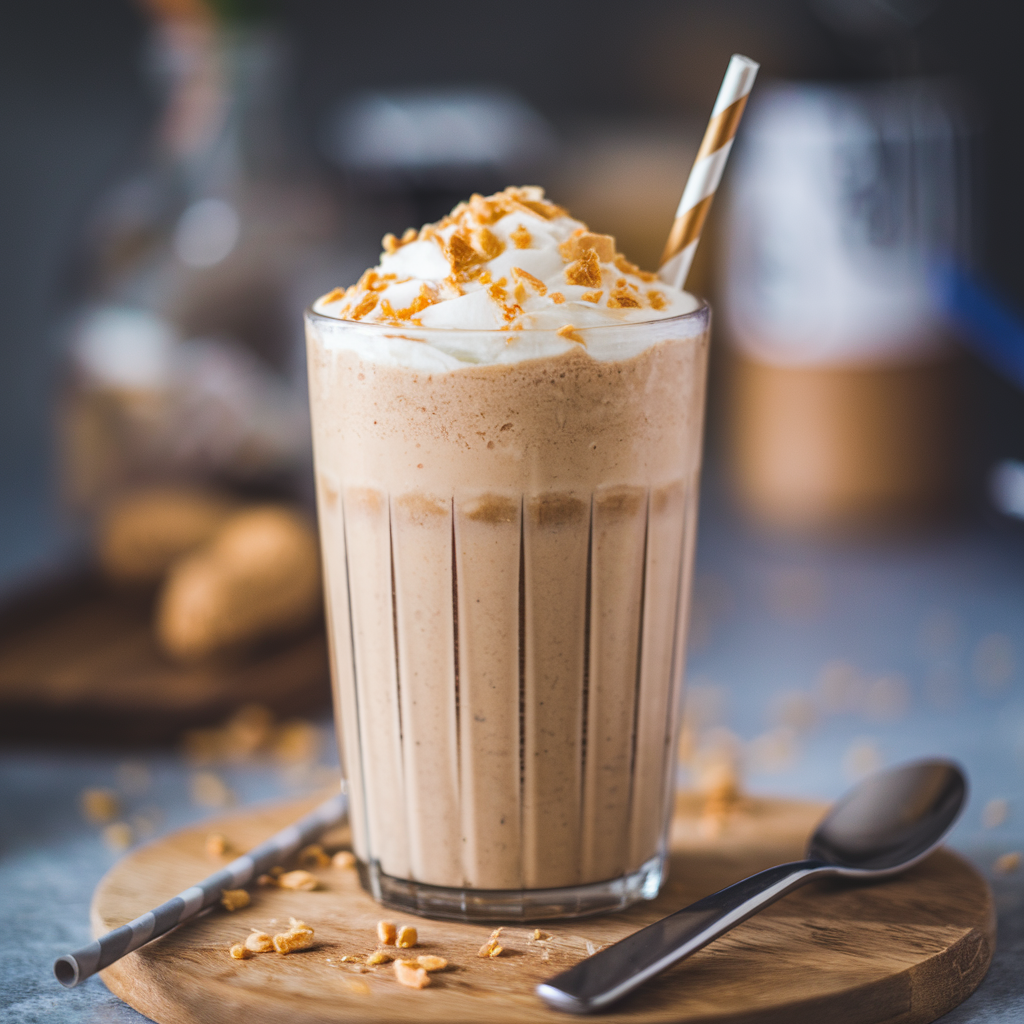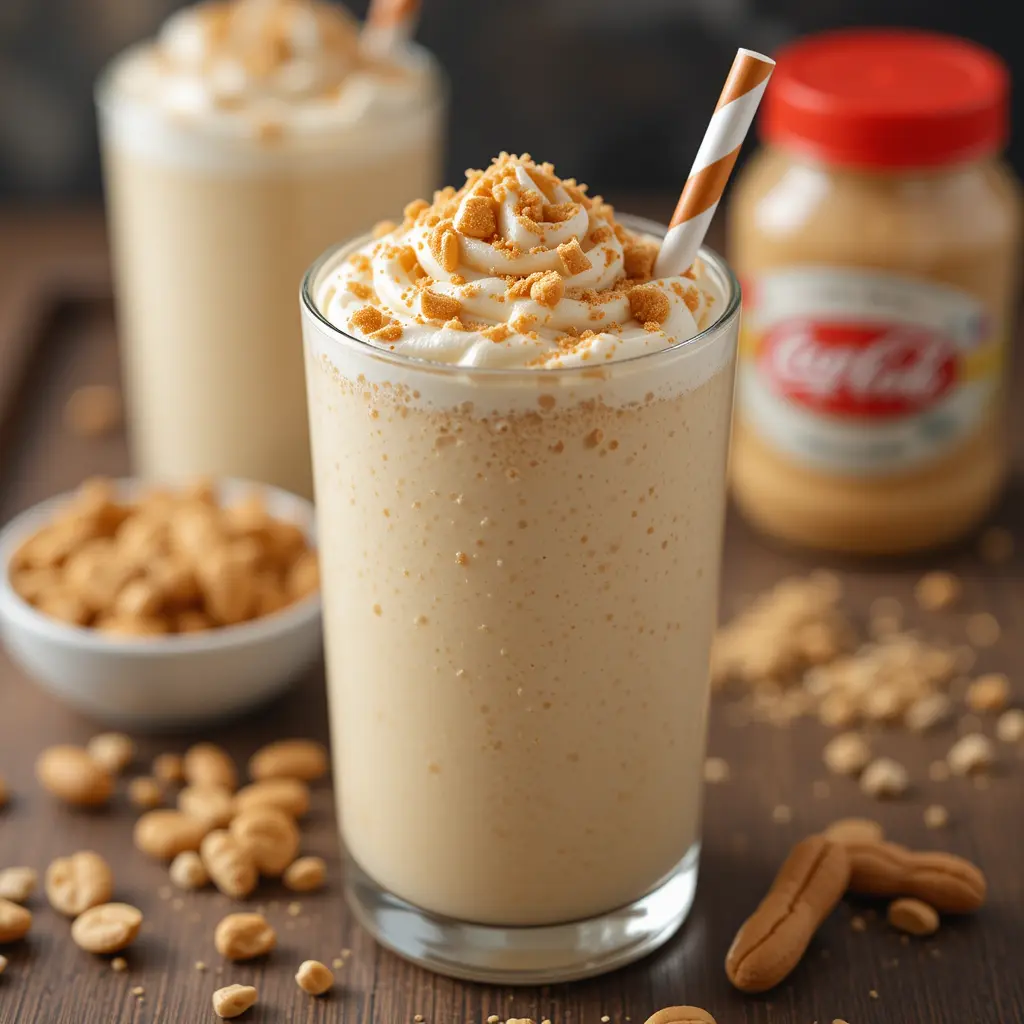Introduction
Peanut butter milkshakes are a delicious and indulgent treat, combining the rich flavor of peanut butter with the creamy texture of milk and ice cream. For many, they are a go-to comfort food, a refreshing snack, or even a post-workout recovery drink. But when it comes to health, the big question is: Is a peanut butter milkshake good for you?
In this article, we’ll explore the nutritional profile of peanut butter milkshakes, their potential benefits, and some of the drawbacks to consider before making one a regular part of your diet. We’ll also discuss how to make your peanut butter milkshake healthier without compromising on taste. Whether you’re a fitness enthusiast, someone looking to enjoy this treat occasionally, or just curious about its nutritional value, read on to find out whether peanut butter milkshakes are a good choice for your health.
What is a Peanut Butter Milkshake?
A peanut butter milkshake is a creamy beverage made by blending peanut butter with milk and ice cream, often sweetened with sugar or flavored syrups. This drink is typically rich in protein, fats, and calories due to its key ingredients: peanut butter, milk (or a milk substitute), and often ice cream or yogurt.
Ingredients & Preparation Process
- Peanut Butter: The star ingredient, providing a rich, nutty flavor and a significant amount of healthy fats and protein.
- Milk: Usually, whole milk or dairy milk is used for creaminess, though alternatives like almond milk, oat milk, or soy milk can be swapped in for those with dietary restrictions.
- Ice Cream or Yogurt: Traditional milkshakes include ice cream for added creaminess and sweetness, but for a healthier twist, yogurt or frozen bananas might be used.
- Sweeteners: Depending on your preference, sugar, honey, or flavored syrups can be added to enhance sweetness.
While the exact recipe can vary, these basic ingredients are what make up the bulk of a peanut butter milkshake.

Nutritional Breakdown of Peanut Butter Milkshake
When evaluating whether a peanut butter milkshake is good for you, understanding its nutritional content is essential. While this treat is undeniably tasty, it’s important to analyze how it impacts your daily nutritional intake. Here’s a closer look at the typical components of a peanut butter milkshake:
Calories
Peanut butter milkshakes tend to be calorie-dense due to the combination of peanut butter, ice cream, and milk. On average, a standard serving of peanut butter milkshake can range from 400 to 800 calories per glass, depending on the ingredients used and portion size. The bulk of these calories typically comes from fats and sugars, especially when ice cream is added.
- Peanut Butter (2 tbsp): 180-200 calories
- Milk (1 cup, whole): 150 calories
- Ice Cream (1/2 cup): 140-200 calories
This combination leads to a rich, high-calorie drink that might not be suitable for those on calorie-restricted diets unless consumed in moderation.
Proteins
Peanut butter is a good source of protein, which is essential for muscle growth, tissue repair, and overall body function. A typical 2-tablespoon serving of peanut butter contains about 8 grams of protein. Milk also contributes to the protein content, with about 8 grams of protein per cup of whole milk. As a result, a peanut butter milkshake can offer around 15-20 grams of protein in one serving, which is a good amount for a snack or post-workout recovery.
Fats
The majority of the fat in a peanut butter milkshake comes from the peanut butter itself. Peanut butter is high in healthy unsaturated fats, specifically monounsaturated fats, which are beneficial for heart health. However, the fat content can still be significant.
- Peanut Butter: Contains about 16 grams of fat (of which 3 grams are saturated fat) in a 2-tablespoon serving.
- Whole Milk: Provides about 8 grams of fat, including around 5 grams of saturated fat.
Overall, a peanut butter milkshake might contain 20-30 grams of fat, depending on the portion size and type of milk used. While unsaturated fats are beneficial, consuming high amounts of saturated fat regularly is linked to an increased risk of cardiovascular diseases.
Carbohydrates and Sugars
Carbohydrates in peanut butter milkshakes primarily come from milk, ice cream, and any added sugars or syrups. A standard peanut butter milkshake can have around 40-60 grams of carbohydrates, depending on whether sweeteners like sugar or honey are used.
- Peanut Butter: Contains around 6 grams of carbs per 2 tablespoons.
- Ice Cream: Adds about 20-30 grams of carbs per ½ cup serving.
- Milk: Around 12 grams of carbs in a cup of whole milk, largely from lactose (milk sugar).
The sugar content, especially if syrups or extra sugar are added, can push the overall sugar count to 30-50 grams, which is a significant amount, especially if consumed frequently.
Micronutrients
In addition to macronutrients, a peanut butter milkshake also provides some essential vitamins and minerals, especially when made with whole milk or added nutritious ingredients like bananas or yogurt. Key micronutrients include:
- Calcium: From milk, crucial for bone health.
- Magnesium: Found in peanut butter, helps regulate muscle and nerve function.
- Vitamin E: Present in peanut butter, supports immune health.
- Potassium: If added with bananas or yogurt, peanut butter milkshakes can provide a good source of potassium, which supports heart and muscle function.
Benefits of Peanut Butter Milkshake
Despite its calorie density, peanut butter milkshakes can have several health benefits if consumed in moderation. Below are some of the reasons why you might want to incorporate a peanut butter milkshake into your diet occasionally:
Protein Boost
As mentioned earlier, peanut butter milkshakes are packed with protein, which is vital for muscle repair, especially after exercise. The combination of peanut butter and milk provides a good mix of plant and animal-based proteins, making it an excellent post-workout recovery drink. Protein helps in building and repairing tissues, maintaining lean muscle mass, and promoting overall body function.
Healthy Fats
The unsaturated fats in peanut butter, specifically monounsaturated fats, can contribute to heart health. These healthy fats help reduce bad cholesterol (LDL) levels and support good cholesterol (HDL) levels, lowering the risk of cardiovascular diseases when consumed as part of a balanced diet.
Energy Source
A peanut butter milkshake can provide a sustained source of energy. The combination of protein, fat, and carbohydrates means that it offers a slow-release energy boost, making it ideal for those who need a mid-afternoon snack or a pre- or post-workout fuel. This balance of macronutrients ensures you won’t experience the energy crash that often accompanies sugary snacks or drinks.
Satisfies Hunger
Because of its high protein and fat content, a peanut butter milkshake can help you feel fuller for longer. It’s a satisfying drink that might help curb your appetite and prevent overeating. This could be especially helpful if you are trying to manage your weight by controlling your food intake.
FAQ
1. Are peanut butter milkshakes good for weight loss?
Peanut butter milkshakes are high in calories and fat, which may not make them the best option for weight loss if consumed regularly. However, they can be part of a balanced diet if enjoyed in moderation, especially if made with healthier ingredients like low-fat milk or yogurt, and reduced sugar.
2. Can I make a peanut butter milkshake healthier?
Yes, you can make a peanut butter milkshake healthier by using alternatives such as almond milk or oat milk, opting for Greek yogurt instead of ice cream, and reducing the amount of added sugars or sweeteners. You can also add fruits like bananas or berries for extra nutrients.
3. How much protein does a peanut butter milkshake have?
A typical peanut butter milkshake contains around 15-20 grams of protein, thanks to the protein content in peanut butter and milk. This makes it a good option for post-workout recovery or a protein-rich snack.
4. Can peanut butter milkshakes be part of a healthy diet?
Yes, peanut butter milkshakes can be part of a healthy diet when consumed in moderation. Their high protein and healthy fats content make them a good option for energy and muscle recovery.
5. Are peanut butter milkshakes suitable for people with lactose intolerance?
Yes, people with lactose intolerance can still enjoy peanut butter milkshakes by using lactose-free milk or plant-based milk alternatives such as almond, soy, or oat milk.
6. Can peanut butter milkshakes help with muscle recovery?
Yes, the combination of protein from peanut butter and milk makes peanut butter milkshakes a good choice for muscle recovery after exercise. Protein is essential for muscle repair, and the milkshake’s healthy fats and carbohydrates provide sustained energy.
7. How many calories are in a peanut butter milkshake?
The calorie content of a peanut butter milkshake can range from 400 to 800 calories per serving, depending on the ingredients and portion size. Ice cream and added sugars contribute significantly to the calorie count.
Conclusion
Peanut butter milkshakes are a delicious and satisfying treat that combines the rich flavor of peanut butter with the creamy texture of milk and ice cream. While they offer several nutritional benefits, such as a good source of protein, healthy fats, and essential vitamins and minerals, they also come with some drawbacks due to their calorie density, high fat content (including saturated fat), and potentially high sugar levels.
These milkshakes can be a great option for a post-workout recovery drink, providing a balanced mix of macronutrients to refuel the body, or a filling snack.
For those looking to make their peanut butter milkshake healthier, opting for alternatives like low-fat milk, yogurt, or a reduction in added sugars can help maintain its rich flavor while lowering the calorie count. Overall, when consumed occasionally and in the right portion sizes, peanut butter milkshakes can be a tasty and nourishing addition to your diet.

